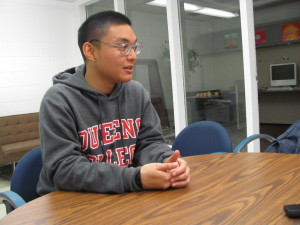
The Knight News sat down with Christopher Labial to discuss his first semester as Student Association President.
It all started at Midnight Breakfast during spring 2013.
During election week, Christopher Labial voted for Students for Change after a discussion with SFC member Jennifer Hwang. He glanced at card given by Hwang and noticed something new not offered in fall 2012—Midnight Breakfast.
The event lacked a sponsor the previous semester, so Labial offered to co-sponsor with F.L.I.G.H.T., a Filipino club he recently joined. From then on, he continued working with Student Association.
Today Christopher Labial leads SFC and is Student Association President after voted in last semester.
Labial is familiar with Queens College’s functions as he attended Academic Senate meetings when he was a student representative. Meetings with administrative officials ignited his interest and curiosity.
“I remember getting out of a meeting with a budget sheet. I’d have these numbers and ask my friends, ‘Did you know this?’ and they would say ‘Wow,’” Labial said. “You can learn from practically volunteering to participate [in the meetings], and it was my intrigue in how the school works.”
At the beginning of his tenure was Welcome Day, which featured recording artist Omarion, on Aug. 26. Labial gave his first speech to a crowd that broke the event’s attendance record.
“The administrators were really happy with my speech. It let them know that our students can connect together with something as simple as a speech,” Labial said.
Labial also gave a speech at the Sept. 11 Memorial. SA collaborated with athletics in preparing for the event, which Labial noted does not happen often.
Labial thought his biggest accomplishment so far was the number of co-sponsorships made for events.
In the first Campus Community Partnership meeting, SA held a workshop on filling out a Student Association Event Funding application that clubs were confused about.
“Co-sponsorships, that’s like our favorite thing. Our e-board’s mentality this year is that we don’t want to compete with clubs with their events, but we want to find ways to make their events better,” Labial said.
In addition, SA sought to implement participatory budgeting, a democratic process allowing people to decide and formulate a budget. Labial communicated with colleges with a similar model, and he saw both their design and implementation.
The process would bring students, clubs and non-voting administrators to “see what they care about” and formulate a budget, Labial said.
“It’s going to be awesome. We’re investing a lot of energy into this,” Labial said.
Labial said his administration would also assist in stopping tuition hikes. Labial and other SA members worked with the University Student Senate, an organization of student government members from different CUNY schools who discuss university-wide issues.
“It’s a scary thing. If [CUNY] passes it, five years max with $300 raise on tuition, it has the potential to be $7,000 or $8,000 a year for CUNY students,” Labial said. “Also, in the proposal, [the Tuition Assistance Program] isn’t reformed. What happens to students who rely on TAP for going to school?”
Labial said the tuition hikes would not improve education resources, but instead “keep the lights on.”
“This is something I’ve been proud of and have a chance to learn more about what’s happening in CUNY. I literally have a say to testify against it. I feel like that is the biggest duty that I have—to speak for the students,” the SA president said.
Despite his work, Labial felt slightly disconnected from students. In a literal sense, he started from the basement of the Student Union to the third floor.
He was a “basement rat” for his first three years at QC. He loved interacting with clubs and saw the basement as a flourishing neighborhood. But that interaction became a luxury with schedule full of meetings.
With administrators, he acts as a student ambassador. For example, Vice President of Finance and Administration William Keller notified Labial about vending machines now accepting credit cards. However, Labial used the new system that morning, confirming it was implemented.
“They’re the people who manage these kinds of things, but they spend their time in the offices. Only a student like me, who lives a daily life by going to the vending machine or looking at the food trucks, would know,” he said.
Labial realized, as president, he represented the student body. But, at the same time, he felt like another student.
“I’m no longer a bystander, but, when I walk on campus, a great amount people don’t know who I am, and the same thing for the administrators,” Labial said, “It’s like I play this role, but I just wear the hoodie like anyone else.”














